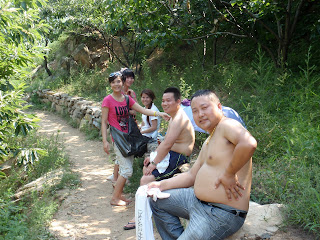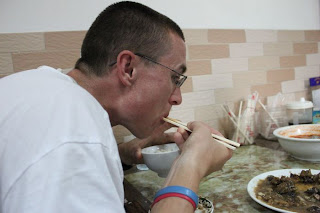
Pig roast to celebrate the Assumption of the Blessed Virgin Mary
Well, I'm a week from starting my 20th year of studies. When I was younger, people always asked me if I wanted to be a doctor like my father. I always said 'No', because there is too much schooling involved. Little did I know that I would be putting in more classroom time than a med student would. On Thursday in St. Peter's Basilica, Bishop Hebda of Gaylord, MI will ordain 31 men to the transitional diaconate. They will then be ordained priests in there respective dioceses next summer. So this week is a big one here at the college with all the families and friends in town for the celebration. I am singing in the choir again for the ordination. The collection of sacred music we are singing is one of the best I have ever heard. It truly adds a lot to the mass.
One Sunday some of us took a trip to Monte Casino, where St. Benedict started his order. This is the altar where brother and sister Saints Benedict and Scholastica are buried.
Some may ask me what we were doing at the seminary for the month of September since classes don't start until the second week of October. Well, early in September, I helped with orientation for the new men. I was the Student Activities Chairman. This entailed making sure the student lounge was open and operating as well as our student store KNAC (like Kmart). I was also responsible for organizing different activities in the afternoons such as ultimate frisbee, basketball, soccer, and other sports. Its interesting to notice that more guys every year are interested in sports and playing sports. It seems that my class is more active than the class ahead of us and so far, there seems to be more new men playing sports than my class. I've mentioned this before, but who else at the age of 26 can play competitive sports as often as I can. It truly is a blessing for someone as competitive as I am.
We also had a number of week long workshops. One was on spirituality, another was on priestly identity in particular focusing in on celibacy as an invitation to love and serve as Christ did. We also had a week focused on preaching. I gave my first three homilies. It went better than I expected, but it is definitely something I need work on. I need to find my own style both in composing and actually preaching homilies, but that will come with time. We also had a week of retreat. A week of silence, rest, and prayer. I was telling some of the guys what a blessing it is to have the opportunity to do that once a year. I realize all of you are busier than I am but if you could work that into your life once a year, you would cherish the fruit that comes from it. I know the Jesuit Retreat House in Demontreville in Minnesota has men's retreats every week. They usually start Thursday evening and run through Sunday afternoon. I know a number of men who look forward to that weekend all year.
It was a great summer. I don't think it could have been anymore productive, and everything went smoothly for me. After returning to Rome from China, I flew an hour west to the Island of Sardinia. Its still Italy and therefore I had the opportunity to improve my Italian. I stayed at a large house owned and run by the Sons of the Immaculate Conception, a religious order founded by Blessed Luigi Monti. It is a place where different groups will come and have Catholic summer camps, retreats, and other conferences. While I was there, there were three different groups that came through. The first two were from the same parish. One camp was for 10-11 year olds and the other was for 15-17 year olds. The third one was more of a retreat for the Directors of Religious Education throughout the local diocese. Each group brings there own counselors, campers, and cooks. Therefore, I didn't have much real responsibility. I basically hang out with the kids (we played a lot of soccer), help clean, participated in small group discussions when possible (this was all in Italian) and basically be present as a seminarian pursuing the priesthood which I find more and more is fruitful in itself, especially when they see that a seminarian can still play sports and play them well.
I enjoyed my time there greatly. I was up in the mountain and therefore much cooler than it is in Rome. I don't think my room has dipped below 75 degrees since I have been back. The food was great as well. For the Solemnity of the Assumption of the Blessed Virgin Mary, Father Giuseppe (the priest in charge of the house) had some of his family over. They cooked a pig on rotisserie over an open fire which was delicious. Also, the town just down the mountain has a unique devotion to their patroness "La Nostra Donna Delle Neve" (Our Lady of the Snows). I was thinking we should adopt her as well for those of us living in Minnesota. That feast lasts almost a week and includes a procession up the mountain, a mass at the shrine, a large pranzo (Italian lunch), a procession back down the mountain and then up to the basilica that sits at the top of the town, a fireworks display followed by Eucharistic Benediction.
Now maybe in the southern parts of the US, especially with the higher percentage of Latinos, there is something of this sort, but where I'm from there is rarely anything like this and never on this large of a scale. The processions were cool. There were people riding horses (Naomi, you would like this part) followed by a big cart with the statue of "La Nostra Donna Della Neve" with the child Jesus pulled by two huge Red Oxen followed by men and women praying the rosary and singing Marian hymns. I also appreciated the fireworks display. They had a type of fireworks that I had never seen before. It was like a machine gun spraying bullets in one direction and then the other. The night ended as I said with Eucharistic devotion and a homily given by the parish pastor. Almost everyone in Italy is Catholic, but few actually practice their faith. But the whole town was there, and as a result an event like this gave the pastor an opportunity to speak to those who otherwise wouldn't have come to the Church.
Going up the mountain!
The final stretch of the procession into Cuglieri.
My Italian improved during my time in Sardinia. I fixed a few things as far as pronunciation is concerned and I believe my listening comprehension also improved.
In looking back over my summer I am definitely content with it. Most guys either do language study or some other type of pastoral work such as a visit to China. I was able to do both along with having most of my family visit for an entire week which was a blessing. On the other hand, even though my summer was great, I still couldn't wait to get back to the NAC and see the guys again. In fact, I basically ran back from the train station last Saturday evening. That is a blessing in itself to be happy where you are in life, because I realize not everyone is. So praise God!
La Nostra Donna Della Neve with the child Jesus















